Broody hens can be a magical addition to the backyard flock or a major headache depending on the situation. Here is everything you need to know about broody hen behavior including why chickens go broody, how to care for them and how to “break” them
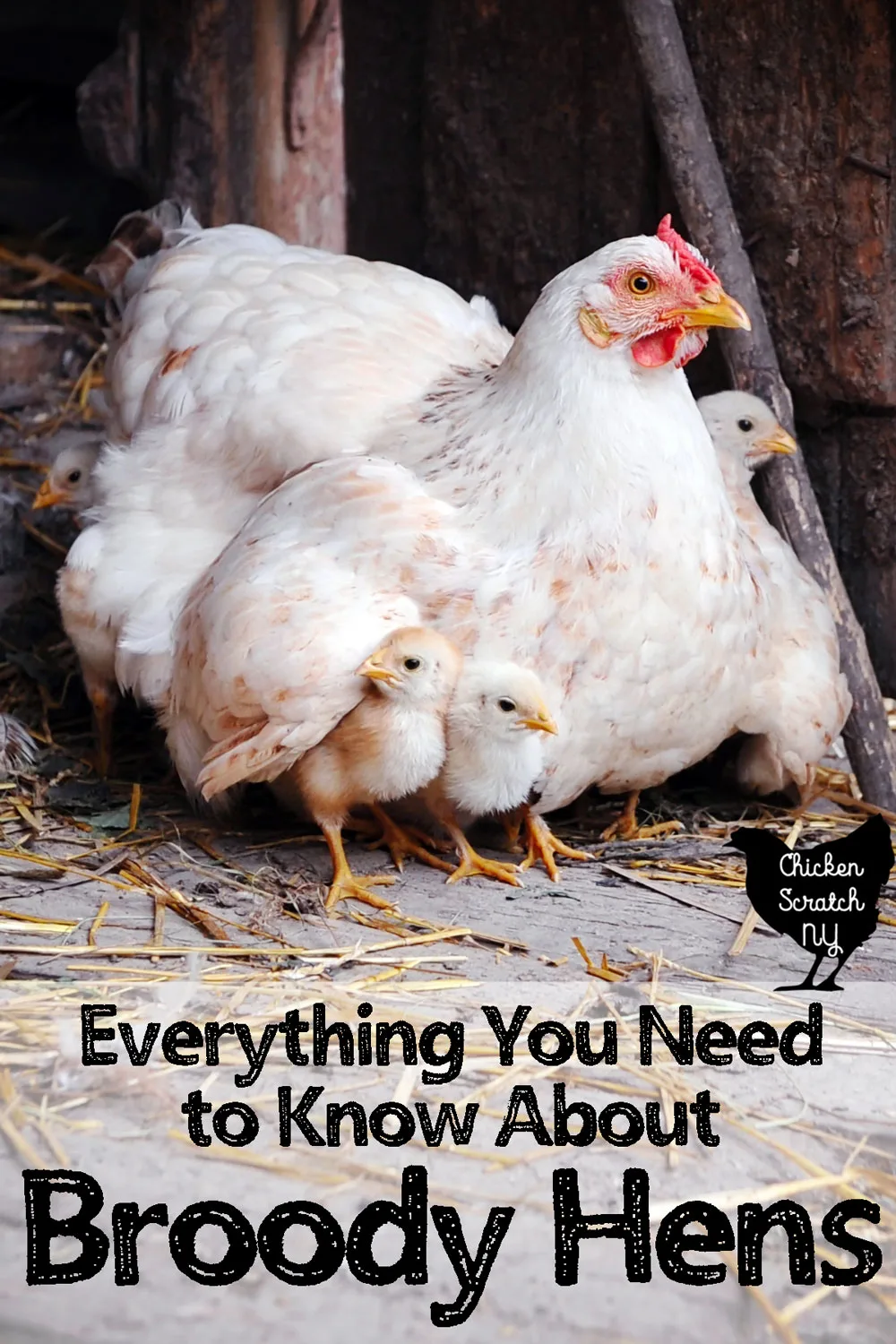
Just a heads up, I’m writing this with chickens in mind but all of this information is more or less the same for turkeys, guineas, ducks, and geese. There are minor differences here and there, mostly related to the time frame.
Chicken eggs hatch in 21 days, turkeys, guinea fowl, and regular ducks hatch in 28 days, Muscovy duck eggs hatch in 35 days and geese take anywhere from 28-35 days depending on the size of the goose. It takes a lot of patience to make eggs into babies!
There is a lot to cover on the topic of broody hens so grab a cup of coffee and a snack and buckle up.
What is a Broody Hen?
We say a hen has “gone broody” when something in her biological clock kicks in and she starts sitting on a nest of eggs. It usually happens in the spring or early summertime but I’ve had hens suddenly go broody in September.
The most obvious sign of broody hen behavior is she won’t get off the nest. Sometimes the first sign is that you can’t find her at all, not all hens go broody in the nest boxes, some prefer to hide their nests.
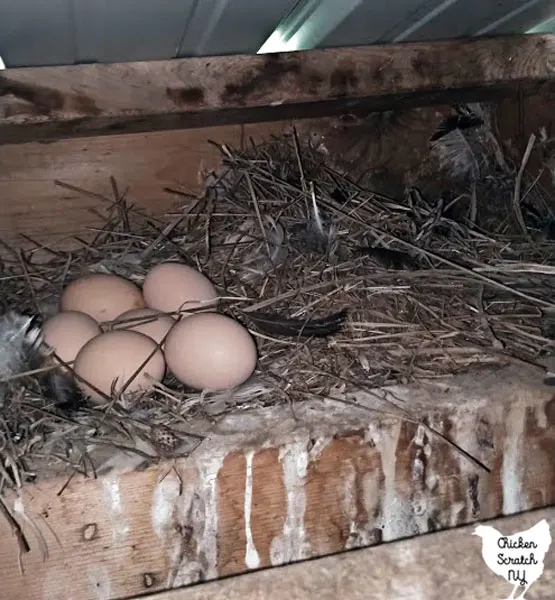
I have one Wheaten French Marans that has hidden and hatched 2 separate clutches of eggs in the rafters this summer. Not a lot of things are more fun than perching on a step ladder over an angry nesting goose trying to grab baby chicks out of the barn rafters.
Sometimes they try to start a family outside the barn. I’ve spent many mornings casually stalking a chicken after breakfast that was nowhere to be seen at bedtime just so I could track down her nest.
I don’t let my chickens sit outside the barn, we have too many predators wandering around.
The only exception is my guineas that insist on nesting in the vegetable garden. The garden is fenced and aside from the rabbits that have millions of babies and eat all my beans nothing else ever seems to go in there.
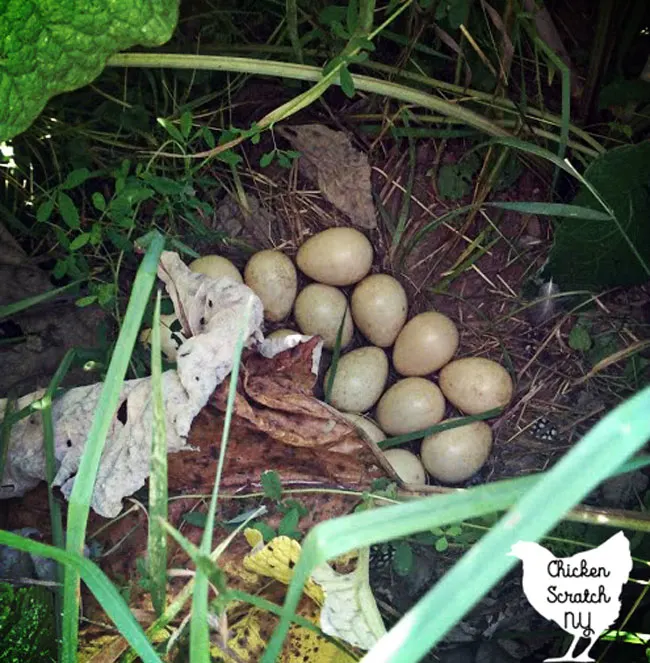
It’s not as safe as the barn, but I have better things to do with my time than try and tell my guinea fowl what to do with their lives.
Everything You Need to Know about Keeping Guinea Fowl
There are a few other behaviors you can look for including the broody stare, the broody patch and, the least fun in the group, the broody poop.
The Broody Stare
Broody hens have a very intense but blank stare. I don’t know if they’re meditating or just counting down the days until they can poop like normal.
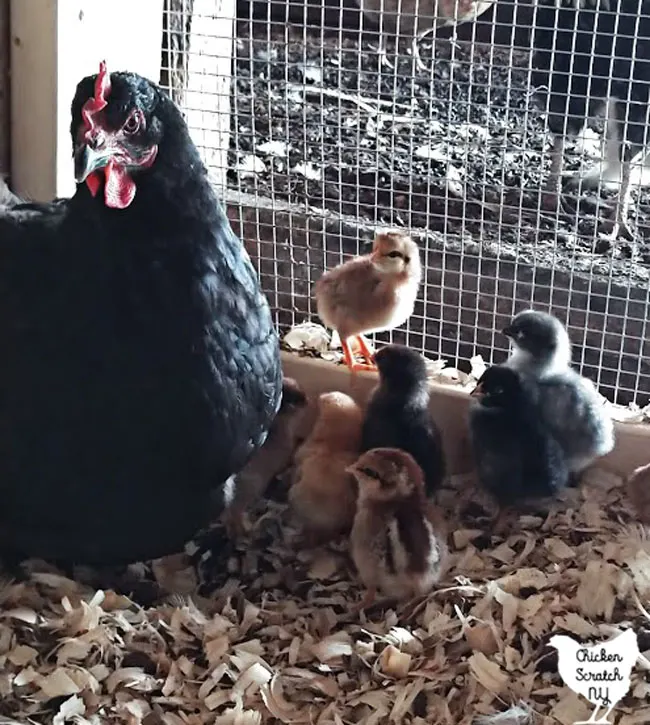
If you approach a broody hen on her nest you’ll notice she’s staring at nothing. As you get closer you might get a warning brroooooo or a slight puff up in her feathers or she might attack your hand. It’s different between individual birds.
With my flock, I’ve noticed that non-broody birds will take off when I stick my hands in the nest box to collect eggs but the broody ladies will stick around.
The Broody Patch
The point of being broody is to hatch eggs and obviously, you need heat to do that. When birds go broody they’ll pull the feathers out of their lower breast area so the eggs get direct skin contact.
It’s not always obvious when the birds are walking around but if you stick your hand under them you’ll feel skin and not feathers.
Ducks and geese take this behavior to the next level and fully line their nests with down and feathers. I’ve never stuck my hand under a goose to feel for a broody patch because I’m not insane (and I enjoy having all of my fingers) but their nests are pretty obvious due to this behavior.
The missing feathers don’t really matter in the long run, even if you end up breaking the broody hen (more on that later). Chickens go broody during the warm months when the feathers won’t be missed and molt in the fall, growing in a new feather coat before the temps drop.
Read more about The Fall Molt & Your Flock
The Broody Poop
Oh yes, the broody poop is a real fun phenomenon you’ll get to experience when you have broody birds. Broody hens only get off the nest once or twice a day and they have to make that count.
Chickens pretty much poop constantly but they don’t poop in their nests (unless they’re roosting and sleeping in them but that’s a topic for another day). So when you distill an entire 14 hours worth of pooping into one time, it’s… big.
Chicken broody poops are bad enough but broody goose poops are one of the worst things on earth.
The smell will make anyone gag and it looks like someone filled a softball-sized water balloon with rotten green slime and aggressively threw it at the floor. Or wall, or unfortunate chicken that happened to be in the wrong place at the wrong time.
Trust me, you do not want to be standing behind a broody goose for that explosion.
Why would I want a Broody Hen?
After reading that lovely description of a broody goose poop you’re probably wondering why you would ever want a broody hen. The only answer is babies.
Is there anything cuter than a big old puffy hen with a tiny baby face sticking out of her feathers? The answer is no.
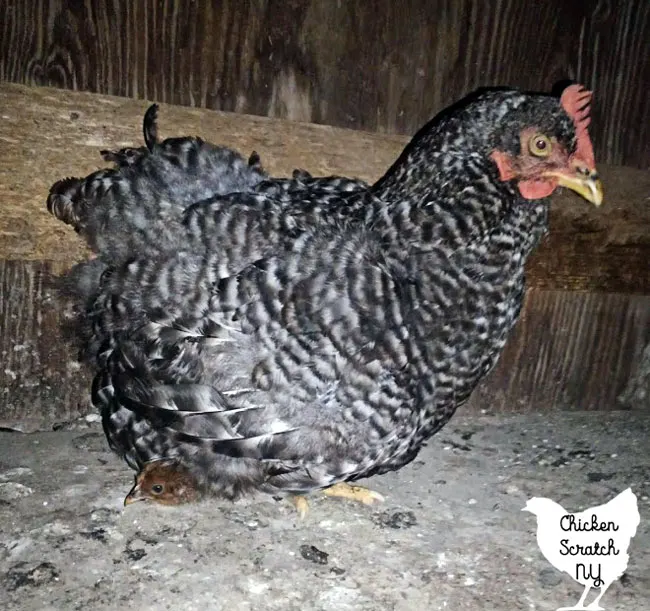
I’ve raised a lot of birds over the years, I’ve ordered chicks in the mail, hatched them in an incubator, and let my flock handle it all on their own. I can say with 100% certainty, it’s easier to let the chickens handle it.
Read more about Ordering Chickens Online
How do I make a Hen go Broody?
If you’re familiar with chickens you know it’s basically impossible to make them do anything. But there is a way you can try to trigger broodiness, you might even do it accidentally.
The best way to do it is to leave a pile of eggs. Some hens will see that and think THIS IS MY TIME and get down to business.
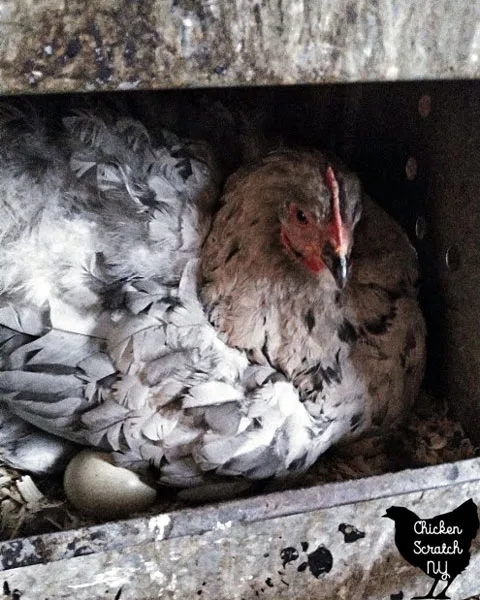
I have a lot of chickens, in the spring I get 2+ dozen eggs a day in my 12 nest boxes. There’s a weird chicken behavior where they all want to lay in the same nest box so it’s not uncommon to have 8-10 eggs in one box.
I think that’s part of the reason why I have so many broody hens. The other reason is I prefer giant fluffy heritage breed chickens like Wyandottes.
Read more about Heritage Cold Weather Chicken Breeds
Even with a whole box of eggs, there are chickens that will never go broody. There is a genetic component to the sitting behavior that I don’t fully understand.
I do know that the high-production hybrid breeds have been bred to lose this behavior. When a chicken goes broody she stops laying and if your goal is to have lots and lots of eggs to eat and sell, broodiness is a bad trait.
Broody Breeds
There are breeds that are known for going broody and they are certainly a good place to start. In my experience, it comes down to the individual bird over the breed. Which of course you can not predict.
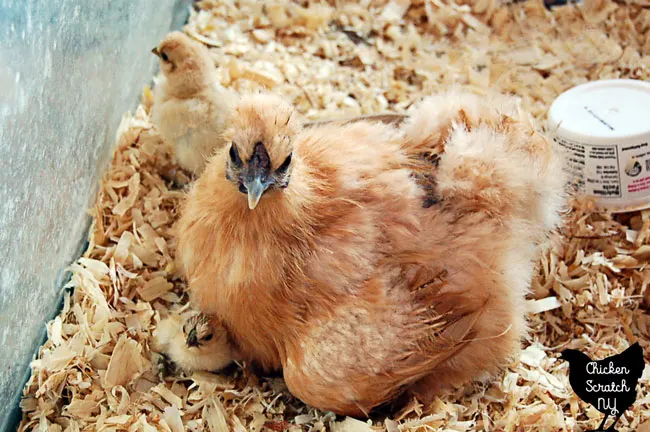
Some of the top breeds known for going broody are Orpingtons, Silkies, Cochins, and Brahmas. Over the years I’ve had all of those in my flock and none of them are my best mama hens.
I do have one Brahma that’s a great mom, I also have one Brahma that’s an awful mom so again, it really comes down a bird-by-bird basis. The majority of my successful broody moms are Wyandottes, Marans, and Easter Eggers.
The most consistent and best mothers I’ve ever had are Blue Laced Red Wyandottes. Specifically the BLRs, I’ve had lots of silver-laced Wyandottes that wanted nothing to do with babies.
Blind Chicken was a BLR that raised a clutch for 6 consecutive years, she only stopped when she went blind. The hen that took over my mail-order guinea keets is also a BLR.
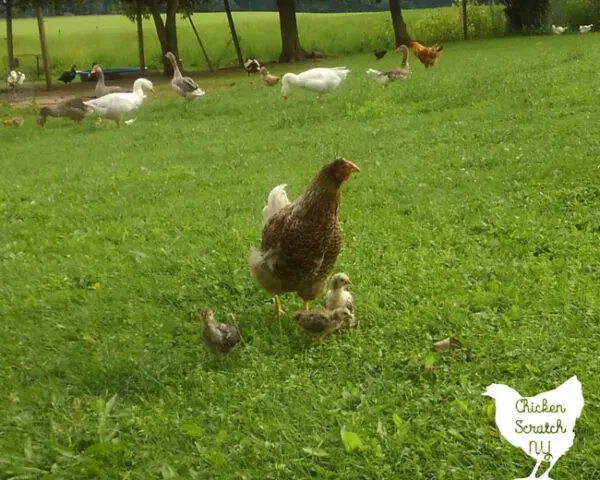
Easter Eggers aren’t really a breed, they’re a category of hybrids bred for colorful eggs. I don’t know if it’s that hybrid vigor kicking in or if one of their parents came from a super broody breed but I have one that rock as a mama ever year.
Read more about Easter Egger Chickens
What it takes to be a Good Broody Hen
Sit on some eggs, hatch some babies. Seems easy right? Unfortunately not, there’s a lot that goes into being a successful broody hen and a lot that can go wrong.
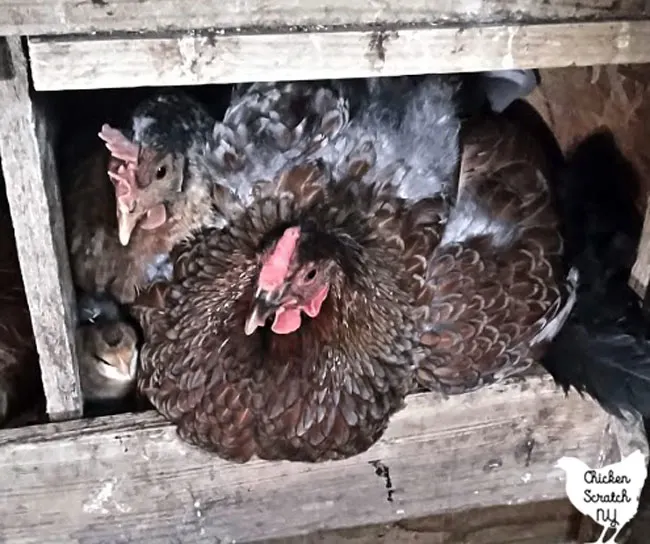
You need three things to happen for your broody chicken experiment to be a success:
- The need to sit for 21 days
- Can’t peace out after the first egg hatches
- Keep taking care of the chicks after they leave the nest
You need all of these things to happen without the prospective mother killing any babies. I’ve seen chickens fail at every step and I have birds that aren’t allowed to sit anymore.
One of my Brahmas goes broody like clockwork but I have to break her every time. The first time she went broody I let her sit, she did a great job and then started killing the chicks as they hatched.
It’s rough but you might find a dead chick in the box, sometimes even pecked apart. It’s the same with an incubator though, the incubator babies don’t always pull through.
I can say that I have better luck letting the hens take charge, a lot less shrink wrapping, and overall healthier chicks. Hatching is hard business and there will always be some potential for fatalities.
I have some hens that really get into the sitting part, they’ll sit until the eggs hatch then take off, abandon the chicks and start sitting on another set of eggs.
On the other hand, I have chickens that deserve gold medals. That Wyandotte I mentioned earlier was sitting on a nest and hatched one chick the same day my guinea keets came in the mail.
I moved her to a small pen with her chick and carefully snuck the keets in a few at a time. She took them all over without a second thought.
We, unfortunately, lost 7 of the keets and her only chick in one day when they were out free-ranging but she’s still going strong with the three remaining keets. Even though they’re well past the age when they’d be fine on their own.
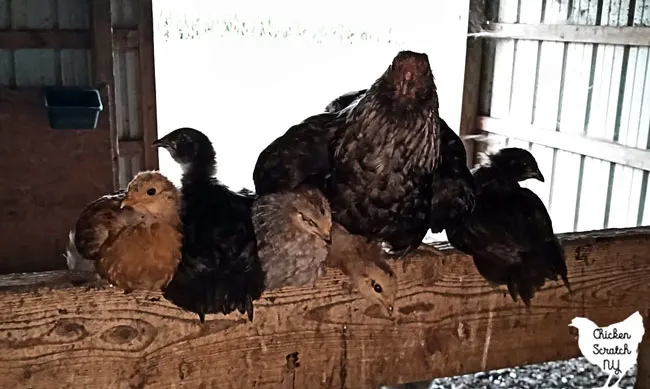
I also have a few hens that lack the patience to really sit for 21 days but they’ll raise anything you toss their way. I have an 8ish-year-old bantam EE that has never shown interest in sitting but this year she raised 6 chicks and even tried to steal a few from another hen.
Playing chick swap is a risky game, it doesn’t always work out. If you’re careful and sneaky you can usually get away with adding extra chicks if you do it early when they’re still little and the chicks you’re adding look like the chicks she already had.
How do I take Care of a Hen that is Broody?
Taking care of broody hens isn’t much different than taking care of your regular flock. Hens stop laying when they go broody so they actually have lower dietary needs.
It’s important that your hen has access to water and food when she gets off the nest. Remember, it’s a one-shot deal and if she can’t find enough food when she’s off the nest she’ll end up losing weight over time.
I have a pretty loose policy on keeping my laying hens out of the broody nests. Usually, I sacrifice 2 or three boxes to the broodies and let them take turns sitting.
As the chicks hatch, I pull the moms off the nests and move them with their babies into a pen.
The “proper” way is to move your broody hens to a separate box so no one can add more eggs to her nest or to mark the eggs she’s sitting on so you can remove the fresh eggs every day.
What Happens after she Hatches Chicks?
You made it through 21 days of impatient waiting (or you forgot you were supposed to be counting and ended up surprised by babies when you were collecting eggs) and you’ve got a box of fluff balls. Now what?
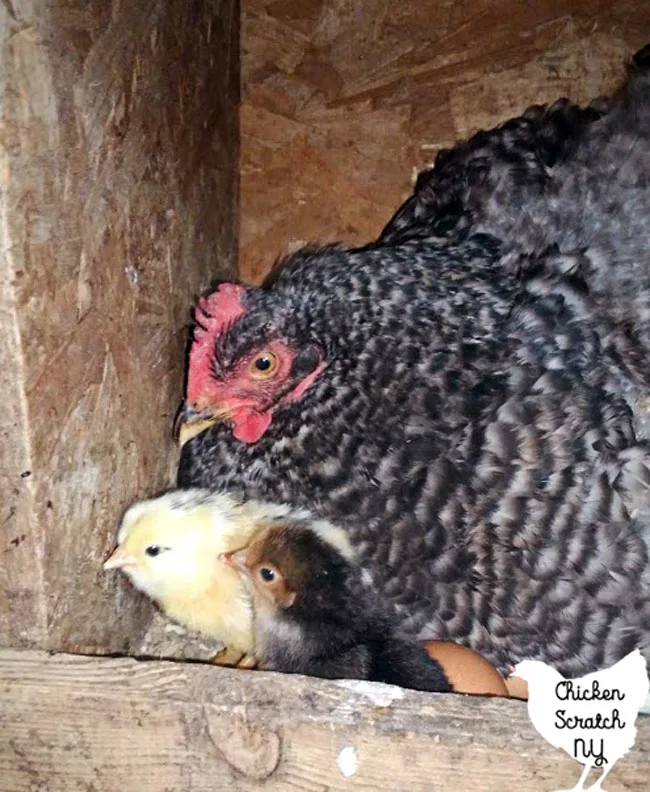
One option is to do nothing. You can leave mama and babies alone and see what happens. This was my old method but unfortunately, you tend to lose more baby chicks this way.
I have one straight black EE that absolutely will not raise a black chick. The only reason I could come up with was her first back of chicks was all light and she thinks the others are imposters.
My preferred method of dealing with a new mom is to scoop up her and her babies and stick them in a pen on lockdown for a few weeks. I’ve used an old rabbit cage, a dog crate, my old 4×8 chicken coop, and this year I built a pen just for my new moms.
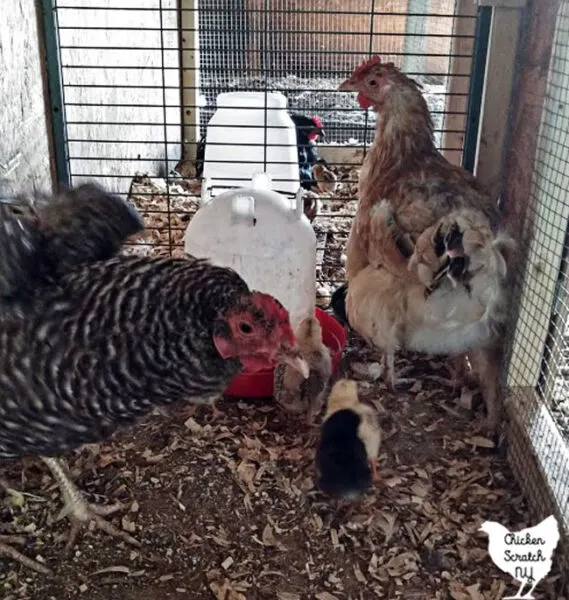
I free-range all of my birds and giving the chicks some time to grow and eat lots of chick starter before they have to compete with the big birds for food gives them a head start. It also keeps the mom from taking them on epic journeys before they’re 48 hours old.
All of the pens I use have wire sides so the birds inside can see the ones outside and vice versa. I’ve never had any trouble reintegrating the moms into the flock, they’re more or less part of the flock the whole time even though there is a physical barrier.
Keeping them locked up in a smaller space also keeps the moms more focused on the babies. I’ve had a few hens that were all about the babies until they moved out of the nest, then they went back to being regular old chickens and left the kids for someone else to deal with.
How do you Move a Nest?
I have never successfully moved a nest. Most of my chickens seem happy to have nests in the barn, the few that have tried to nest outdoors have given up when I tried to move them.
After candling, I just slip any viable eggs under whoever else is sitting at the time and move on with my life. But in theory, it can be done.
Hawk Hill has some advice about moving a broody hen and nest that you might find helpful.
How do you Stop a Hen from being Broody?
There are a few methods to breaking a broody hen and they go from simple to more extreme. There are some hens that give up and move on and others that are so stubborn it seems impossible.
The simplest method is to get rid of the nest, this is what I do when my birds try to hide a nest out in the bushes. Usually bringing the bird into the barn and clearing out the eggs is enough to get them to give up.
It’s trickier when they’re laying where they should be and they want to sit. One of my turkey hens would not stay off a nest for anything. She even hatched a few chickens but kept switching nests when they hatched.
I ended up pulling her off a nest and locking her up for a few days in a pen with food and water but no eggs or thick bedding. It took two tries but she finally gave up.
If that doesn’t work you can try putting your broody hen in a wire cage with a wire bottom. The wire bottom is key here, remember that broody patch we talked about 5 years ago when you started reading this post?
If your lady is in a wire-bottomed cage that broody patch will be exposed to cool air and it should help break her from her broodiness.
When and Why should you Break a Broody Hen?
Broodiness can be a great thing if you’re looking to expand your flock but it can also be a huge headache. Here are a few reasons why you should consider stopping your hen from being broody.
You don’t have a Rooster
Not to get too basic here, but you need a rooster if you’re going to hatch any eggs. If you don’t have one your hen can sit until the eggs rot and explode underneath her but you’ll never get a baby.
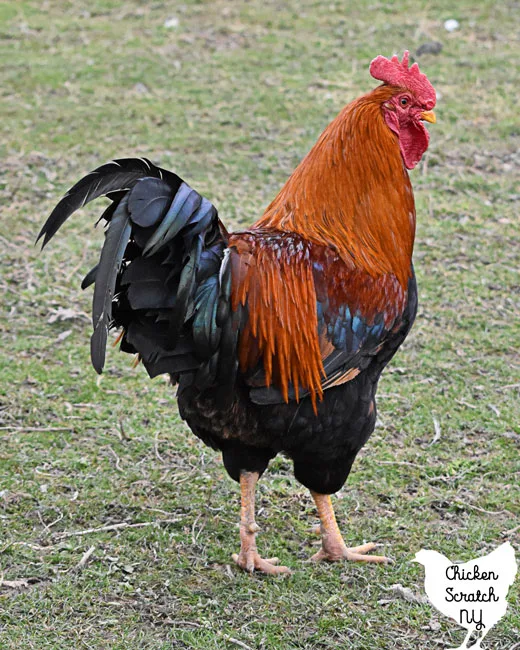
Every year I have 3 or 4 people reach out for fertile eggs for a hen that’s desperate for a family. That’s one way to go if you don’t have a rooster and you want babies.
Another method is to pick up some day-old chicks and sneak them under the hen at night. It’s not guaranteed to work so you should be prepared to set up a brooder and raise them yourself but I’ve had good luck doing this in the past.
Keep an eye on her after you give her the chicks, she should re-fluff her feathers and start softly clucking to them. If she gets aggressive towards them pull them out. Then you get to cross your fingers and hope for the best.
Read more about Chick Days at Tractor Supply and buying Live Chicks in Store
You don’t want Chicks
They’re cute for a week but that’s really not a good enough reason to keep making more. Maybe your flock is already all that you can handle, maybe you’re looking to downsize.
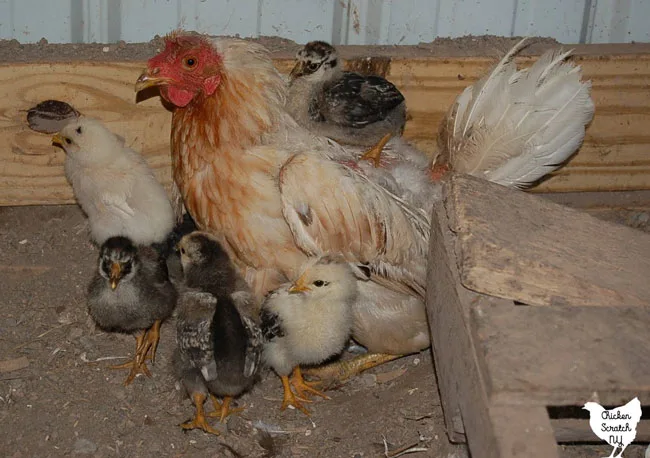
It doesn’t matter why you don’t want chicks, it’s perfectly fine to stop your birds from being broody. It won’t hurt them and they should go right back to digging up your flowers and pooping on your deck in no time.
She’s been Sitting too Long
Being broody is rough on a hen, even though they’re pretty much just sitting in one place for 3 weeks. I try not to let my chickens sit for more than 5 weeks at a time.
She might be sitting too long because the eggs are infertile, she can’t figure out which nest she should be sitting on and keeps switching or she’s one of those birds that just wants to sit forever.
You want Eggs
There is no shame in wanting your chickens to do their job and lay eggs. Afterall that’s why most of us have them.
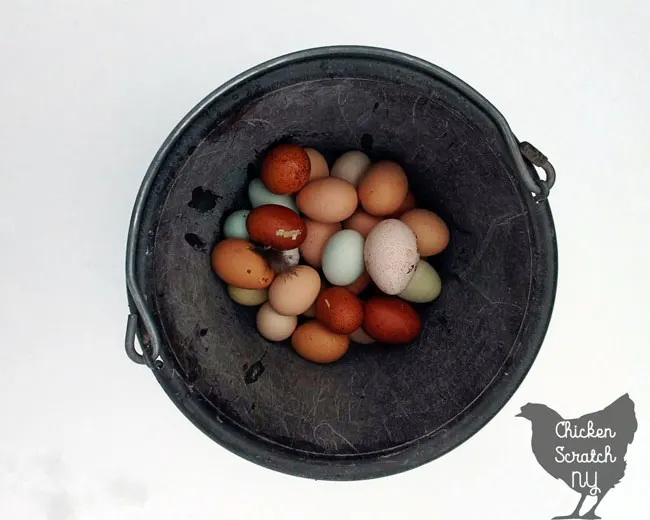
Broody hens stop laying but they keep eating. If you’re looking to make money or break even you might not have 3+ weeks to wait for a hen to start laying again.
Read more about What to Expect from Farm Fresh Eggs
I know I covered a lot of ground today, I hope I’ve cleared up any confusion you’ve had about broodiness and hatching chicks. If not, send me an email or message me on Instagram.
If you’re a fan of baby chicken pics you should probably find me on Instagram anyway!
Check out my Livestock page for more info or start here:

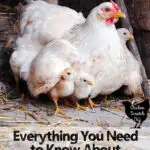
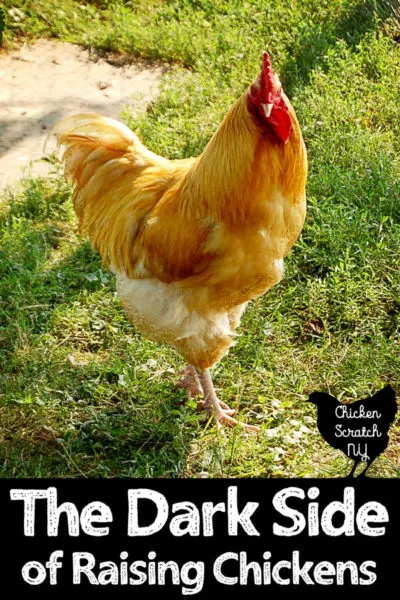
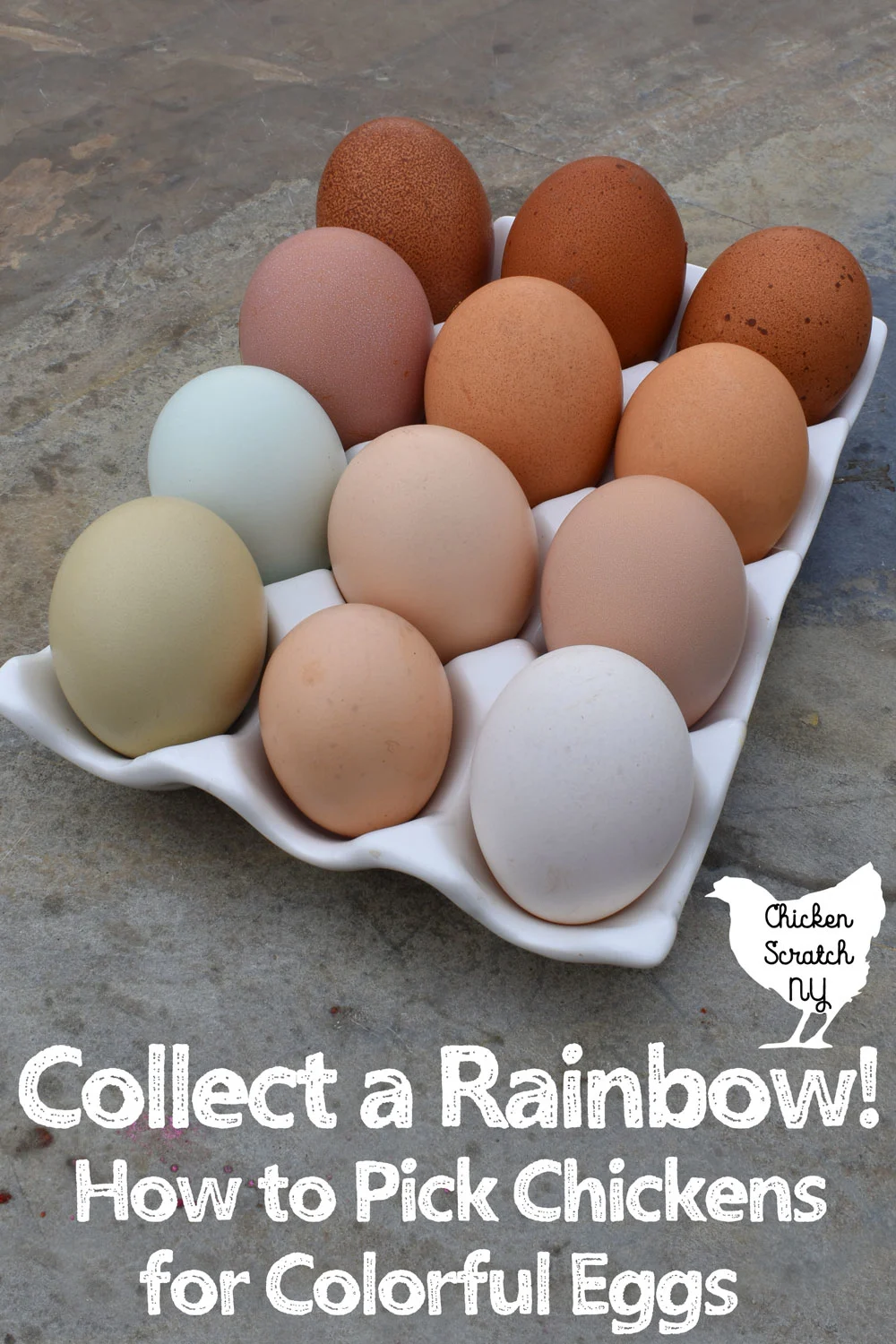
Mary Taff
Tuesday 13th of February 2024
My Snow-white Easter egger has gone broody in the middle of February I live in North Florida is it safe to let her hatch eggs at this time of the year ? 😱 🛐
Alecia
Wednesday 14th of February 2024
That will depend on the weather in your area and the coop/brooder you have set up for them. I wouldn't chance it in New York, we usually have snow through May but I'm not sure about Florida
Valerie
Wednesday 6th of April 2022
I've been wondering if one or 2 of my hens are a bit broody because there seems to be 1 on the nest nearly every time I go out to check for eggs (and they get aggressive and squawk or peck at me if I touch them). I've been contemplating an experiment to mark a few eggs to see if they would hatch them but I also noticed last night that they were all roosting and no one was sitting on the eggs! Do you think it's worth it to try experimenting with having them hatch a few eggs? I was concerned about it when the eggs were abandoned last night and were cold to the touch when I collected them.
Alecia
Wednesday 6th of April 2022
It doesn't sound like they're broody yet, they wouldn't be leaving the nest at night if they were (or they might just not be that good at it yet!). Your experiment wouldn't hurt and if you had a hen on the edge of being broody having a pile of eggs might fully trigger that instinct.
I have a few hens that are *very* big on personal space in the nest box even if they aren't broody.
Peggy Wiggins
Wednesday 5th of January 2022
Enjoyed reading your info. Question after hen sits for 21 days and off nest about how long before they will begin to lay again ? I was thinking 1 week to 2 weeks maybe? Just trying to watch and see if they have changed nest location. Thanks
Alecia
Thursday 6th of January 2022
Hi Peggy, if she hatched anything she won't start laying until she's done raising the chicks. If she didn't hatch anything it can take anywhere from a week up to a month. They tend to lose weight while sitting and need some time to build that back up.
Hunter
Tuesday 12th of October 2021
I free range my chickens, and i had one that was sitting on the nest maybe 5 hours a day, and she just disappeared out of nowheres and there has been less eggs then normal for a few days now, could she be nesting out somewheres? i havent seen any signs of predators, but im still cautious it might have been one, thank you
Alecia
Wednesday 13th of October 2021
She might be hiding but in my experience, even the one nesting in the woods will turn up for breakfast or dinner (they're very food driven)
Erica
Tuesday 5th of October 2021
My hen laid on eggs for 21 days. They ended up not hatching. Can I put a new set if eggs under her? She looks very healthy and does not want to get up.
Alecia
Wednesday 6th of October 2021
As long as she hasn't lost weight and is healthy you can try it, I would recommend checking the eggs around 10 days with a light, at that point you should be able to see movement in the shell.
If you're somewhere with harsh winters I would wait for next season, it can be hard to keep small chicks warn through the winter